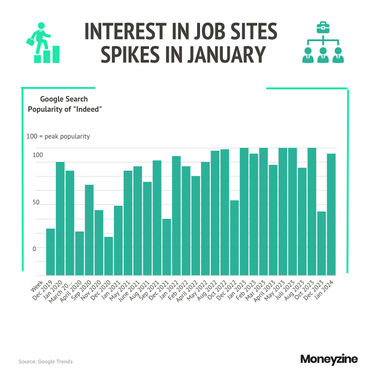- Workers in the finance & insurance industry work an average of 6 hours less per week than the agricultural industry - and yet, they earn over three times more!
- Three industries have an average income per hour over £30: finance & insurance, information & communication, and the mining, energy, & water supply industry.
- The agriculture, forestry, & fishing industry works the longest average working week in the UK (40 hours per week) - and yet, when compared hourly, also earns the lowest wage.
The start of a new year is a time when millions of people across the UK begin thinking about setting new financial goals - with increasing income and saving money popular targets. Linked to this, the new year is therefore a popular time for many to renew their job search and potentially find an entirely new career path.
Google search trends data shows a distinct pattern each year, where searches for popular job sites such as Indeed.com drop significantly in December, followed by a monumental leap in January when people decide to make some serious life changes after the new year.

With the rise of “lazy girl jobs” and “slow living” last year, many people have the same priority right now: to make a high income, without sacrificing their work/life balance. With this in mind, the team at Moneyzine.com have analysed the latest income and working hours data from the 15 main industries in the UK.
We compared the average weekly earnings for each against the average hours worked per week, to discover exactly which industry pays the most for the least effort.
Luke Eales, Moneyzine:
When looking for a complete change in careers, it’s natural to wonder what industry might offer the highest salary. Oftentimes, however, the hourly income for high-paying jobs is low when compared to the average amount of hours a person in that position might be expected to work.
Post-pandemic working attitudes have certainly shifted to prioritise a better work/life balance, with many people wanting more time to do things outside of work. This analysis ensures that job seekers can find lucrative potential careers while still maintaining that crucial balance with their working hours.Luke Eales, Moneyzine
Industries Ranked By Hourly Income:
Industry | Average Hours Worked Per Week (Including Overtime) | Average Weekly Earnings | Income per hour |
|---|---|---|---|
Financial, insurance & real estate activities | 34.4 | £1,320 | £38.37 |
Information & communication | 34.9 | £1,127 | £32.30 |
Mining, energy & water supply | 38.7 | £1,227 | £31.74 |
Professional, scientific & technical activities | 33.7 | £954 | £28.27 |
Wholesale, retail & repair of motor vehicles | 29.9 | £793 | £26.51 |
Public admin & defence; social security | 32.6 | £710 | £21.77 |
Construction | 36.9 | £739 | £20.03 |
Transport & storage | 35.1 | £672 | £19.11 |
Administrative & support services | 30.2 | £571 | £18.91 |
Education | 29.1 | £547 | £18.80 |
Human health & social work activities | 29.8 | £552 | £18.55 |
Manufacturing | 36.2 | £636 | £17.55 |
Other services | 29.4 | £470 | £15.95 |
Accommodation & food services | 24.7 | £305 | £12.36 |
Agriculture, forestry & fishing | 40.0 | £492 | £12.29 |
Top 5 Paying Industries for Average Hours Worked
Financial, insurance & real estate activities
The financial, insurance, and real estate activities industry is the highest paying, both in terms of income per hour and average weekly earnings. The average weekly earnings in this industry are £1,320 - higher than any other public industry in the UK.
Anyone considering a career change in 2024 might look to move into this industry. The average work week for people in these sectors is 34.4 - resulting in the highest overall income per hour worked at £38.37. While workers in this industry don’t work the shortest hours (that title goes to people in the accommodation and food services industry), they do make the most for the amount of hours they work.
Information & communication
Next up is the information and communication industry, which covers jobs such as programmers, computer scientists, IT business analysts, web developers, and data scientists.
People in this industry work an average of 34.9 hours per week and earn approximately £1,127 a week - giving them an overall income per hour of £32.30.
To put that into perspective, workers in this industry work an average of 5 hours less per week than those in the agriculture, forestry, and fishing sector - but earn more than 2.5 times as much per hour.
Mining, energy, & water supply
The third best paying industry for the lowest hours is the mining, energy, and water supply sector. Workers in this industry work a slightly higher average working week than the UK average (36.4 hours per week) at 38.7 houts, but they also earn the third highest income per hour for hours worked.
Professionals in this sector earn an average of £31.74 per hour.
Professional, scientific, & technical activities
Jobs within the professional, scientific, and technical activities industry include careers such as scientific researchers, architecture and engineering, accounting, and other scientific and technical services.
This industry works a far shorter week than the three industries listed above, with an average working week of just 33.7 hours. Nevertheless, it is the fourth highest-paying industry per hour, with average weekly earnings of £994 which translates into an hourly income of £28.27 - still double that of the industry at the bottom of our list.
Wholesale, retail, & repair of motor vehicles
Finally, people in the wholesale industry enjoy a higher income for the average hours worked.
This industry has an average working week of just 29.9 hours per week - but with an average hourly income of £26.51 / weekly income of £793, that still puts careers in this sector within the top five highest-paying/lowest demand bracket.
Top 3 Worst-Paying Industries for Average Hours Worked
At the other end of the scale, there are several industries in the UK that have a low hourly income when the average weekly income is compared to the average hours worked. Let’s look at the bottom 3:
Agriculture, forestry, & fishing
Workers in the agriculture, forestry, and fishing industries work the highest average hours per week overall (40 hours) and receive one of the lowest weekly incomes (£492). That puts jobs in this industry in the bottom position for high income for low hours - with workers earnings an average of £12.29.
That’s more than 3 times less per hour than the financial, insurance, and real estate industry - but with an average working week of 5.6 more hours.
Accommodation & food services
The accommodation and food services has the lowest weekly average income and the lowest average working week average (24.7 hours and £305 per week), and yet it still sits a notch above the agriculture, forestry, and fishing industry.
Workers in this industry earn approximately £12.36 on average.
Other services
The “other services” category encompasses any job that does not fit within the other industries listed. This could include occupations such as the repair and maintenance of equipment, personal care service provision, and management of religious activities.
Jobs that fall into this category have the third lowest hourly income on average, at £15.95. Workers have an average working week of 29.4 and average weekly earnings of £470.
Methodology
We sourced the average weekly earnings and average hours worked of every industry (15 total) in the UK from the ONS Annual Survey of Hours and Earnings.
We then calculated the average hourly earnings for each industry to rank them on hourly income, showing what industries actually pay best when the average working week is also factored in.
Contributors





